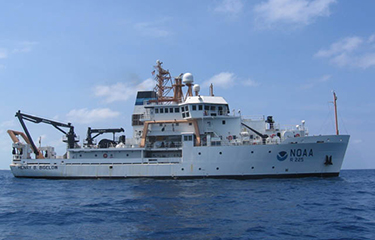NOAA Fisheries has announced that is canceling more fishery and ecosystem surveys that were supposed to take place in 2020, citing the complications created by COVID-19.
The new survey cancellations will add to the growing list of surveys that won’t take place in 2020 due to COVID-19. Earlier this year, NOAA Fisheries cancelled five of the six large-scale research surveys scheduled to take in the waters off Alaska, along with the Atlantic sea scallop and surfclam/ocean quahog surveys, among others.
In the las few days, NOAA Fisheries announced several more surveys will be canceled due to the “uncertainties created by the COVID-19 pandemic and the unique challenges those are creating for NOAA Fisheries.”
On 3 August, NOAA Fisheries announced the cancelation of three West Coast surveys for 2020: the West Coast Groundfish Bottom Trawl Survey, the California Current Hake Ecology and Survey Methods Research Cruise, and the California Current Ecosystem Survey.
The Groundfish Bottom Trawl Survey runs out of the Northwest Fisheries Science Center, and covers the entire U.S. West Coast. According to NOAA, the survey represents “the primary source of fishery-independent data for the management of multiple West Coast fishery stocks.”
“The survey also supports ecosystem modeling and management. The loss of the 2020 survey data could result in increased uncertainty in upcoming stock assessments,” NOAA wrote. “We will coordinate with the Pacific Fishery Management Council for any affected stock assessments and leverage the long time-series data to provide the best scientific information.”
The Hake Ecology and Survey Methods Research Cruise, also run out of the science center, was planned in order to “collect data and refine and enhance operations to prepare for the biennial joint U.S.-Canada 2021 Integrated Ecosystem and Pacific Hake Acoustic-Trawl Survey and conduct research in support of ecosystem modeling and management,” according to NOAA. Contingencies are being developed to ensure that biennial effort continues.
The final of the three West Coast surveys, the Current Ecosystem Survey, also surveys the entire West Coast and gathers biomass information using acoustic sampling and biosampling for coastal pelagic species in the California Current, including Pacific sardine, Pacific mackerel, northern anchovy, Pacific jack mackerel, and market squid.
The Current Ecosystem Survey’s cancelation could cause issues with the anchovy and sardine fisheries. The anchovy fishery has already been coping with a lawsuit over how it is assessed, and the sardine fishery on the West Coast has been embroiled in controversy over its stock surveys.
Those three cancelation announcements were just the start, as on 4 August, NOAA Fisheries announced another spate of cancellations of both fishery and ecosystem surveys due to COVID-19. The new cancelations were the Autumn Bottom Trawl Survey, Summer Ecosystem Monitoring Survey, Northern Shrimp Survey, and Summer and Fall Plankton Survey. Three of the surveys are run out of the Northeast Fisheries Science Center, with the plankton survey running out of the Southeast Fisheries Science Center.
The Autumn Bottom Trawl Survey has been conducted since 1963 and provides data for stock assessments. The multi-species survey collects data in various stations along the coast and provides information on the density of species caught in the survey region.
The Northern Shrimp Survey is used to set fishery quotas for the Northern shrimp species. However, that fishery has been closed since 2014 and will remain closed until 2021, after a decision in 2018 closed the fishery for three more years.
The Summer Ecosystem Monitoring Survey captures “seasonal changes in the ocean environment, information used for multiple scientific inquiries,” NOAA Fisheries wrote. This is not the first time this survey has been canceled, and methods are already in place to “bridge these data gaps.”
The Summer and Fall Plankton Survey covers the “entire continental shelf in the Gulf of Mexico region from Brownsville, Texas, to Key West, Florida.” It is, according to NOAA, “the only fishery independent survey available to measure the spawning capacity of the adult population of Gulf of Mexico king mackerel and an important supplemental survey for red snapper and several other reef fish.”
Then, on 5 August, NOAA announced the cancellation of all remaining Hawaiian Islands surveys for 2020: The Hawaiian monk seal and sea turtle field season deployment and recovery, Hawaiian Islands bottomfish survey, and Hawaiian Islands corals assessment and monitoring survey.
The seal survey is the primary stock assessment for the Hawaiian monk seal, and includes tagging of weaned seal pups, identification of individuals, and the removal of marine debris. The Hawaiian monk seal is an endangered species endemic to the islands, with a population of roughly 1,400 individuals.
The bottomfish survey is a “collaborative, multi-gear survey conducted by our researchers aboard NOAA Ships along with local cooperative research fishers operating aboard small fishing vessels.” That survey estimates the abundance of bottomfish in the region, and is used for stock assessments of the so-called "deep-seven" bottomfish.
The latest survey to be canceled, the corals survey, was planned as a “cruise of opportunity” following the cancellation of another trip earlier this year.
“These cancelations follow similar difficult cancelation decisions of the ship-based work we had planned from April to July,” NOAA fisheries wrote. “NOAA Fisheries is continuing to assess the status of other surveys in all our regions. We are working through numerous survey scenarios relative to community pandemic safeguards and safe work practices so that we maximize the science available for fisheries management in this challenging year.”
Photo courtesy of NOAA







